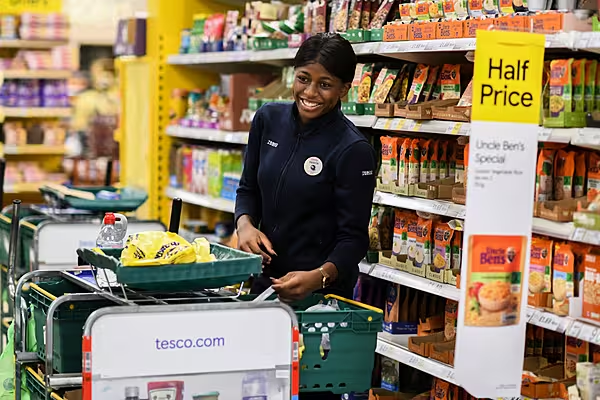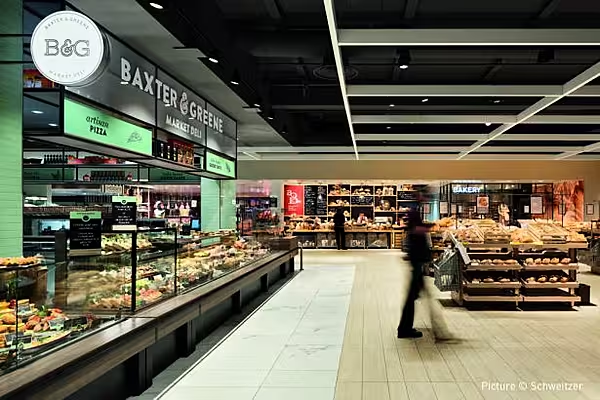Tesco has reported a 6.8% increase in retail like-for-like sales in its 2023/24 financial year, with its core UK business seeing a 7.7% increase in the period.
"We have strong momentum in our business, and are encouraged by signs of improving consumer sentiment," commented Tesco chief executive Ken Murphy.
Here's how leading retail analysts from GlobalData, Shore Capital, Third Bridge, Bernstein and AJ Bell viewed the retailer's performance.
Eleanor Simpson-Gould, GlobalData
“Tesco has produced a decent set of results in a challenging year that has seen the grocer go face-to-face with the discounters and hold its own. The supermarket retailer reported UK like-for-like sales rose 7.7% for the year ending 24 February 2024, though with food inflation around 15% in 2023, this would indicate that Tesco did suffer a decline in volumes during this time as shoppers traded down.
"With inflationary pressure easing, Tesco’s UK performance slowed each quarter from 9.0% in Q1 to 5.8% in Q4, and Tesco is entering a new financial year where we expect to see a normalisation of sales growth. Tesco’s outlook for the new financial year is cautious despite falling inflation as the grocer recognises that consumers remain sensitive to price.
With Tesco losing Lidl’s legal challenge to change its Clubcard branding, Tesco has the opportunity to draw deeper focus on its loyalty scheme. Passing on cost savings to customers will remain a key priority to keep the pressure on competitors and drive volume growth.
“Tesco’s Whoosh rapid delivery service and online sales are going from strength to strength. Against weak comparatives of a 5.4% decline in FY2022/23, Tesco’s online sales increased by 10.4% for this financial year. GlobalData forecasts online food & grocery sales will outperform the offline channel this year, up 6.9% for 2024 versus the offline channel at an uplift of 3.6%.
"To ensure Tesco’s online prospects endure, prices must be at the forefront of all communications to appeal to shoppers who have switched to discounters.”
Clive Black, Shore Capital
"Tesco speaks in its FY24 prelims statement of inflationary pressures easing substantially. CEO, Ken Murphy, speaks to ‘strong momentum’ in the firm and encouragement from improving customer sentiment. A range of modest initiatives in isolation but amalgamating to the fuel to continue sensible growth is evident, e.g., 87 largely convenience store openings and c400 refreshments in FY24, an enhanced transport scheduling programme, plus adopting AI to improve efficiency, supported by c£1.4bn of capital expenditure in FY25.
"Tesco anticipates retail operating profit in FY25 of at least £2.8bn, so c5% annual progress, pls c£80m of EBIT from Tesco Bank, whilst cautiously, sensibly, management is reverting back to RFCF of c£1.4-1.8bn.
"The wider sector context that Tesco UK is operating within is sound to us, with the label gaining market share in an industry where the growth in market value is exceeding new space growth. Market value will be less about price, albeit to us disinflationary rather than deflationary, whilst lower upward price pressure makes for improved volumes and mix."
“Tesco is maintaining the strong progress it had during Christmas into the first quarter. Our experts note an increase in consumer confidence, influenced by factors such as the reduction in the main rate of employee National Insurance, the energy cap decrease in April, and lower mortgage rates.”
Orwa Mohamad, Third Bridge
“Food inflation is expected to align with headline inflation and decline to 4-5% in Q2 2024 as oil prices decrease. The margin is improving because inflation is decreasing and consumer confidence is rising. Customers are spending more on higher-priced items. Tesco's investment in robotics and technology to reduce labor costs is also paying off."
“Our experts anticipate intensified promotional activities across UK supermarkets to compete for market share, particularly focusing on everyday essentials and pantry staples. Loyalty card usage becomes crucial, with Tesco's Clubcard leading.”
“Convenience store format continues with very strong double-digit growth, especially Tesco Express, benefiting from the return to offices in city centres.”
William Woods, Bernstein
"Tesco delivered a good set of results as sticky food inflation in the UK and volume recovery supports top line growth. LFLs continued to be strong at 6.8% for the group, beating consensus expectations by +30bps, driven by strength in UK & ROI (7.3% vs. 7% consensus).
"Retail EBIT also came in line with consensus at £2.9bn (including the discontinued bank business EBIT; Bloomberg headline misses do not account for the discontinued activities). EPS slightly missed (-2.5%) but this was driven by the discontinued ops rather than weak fundamentals."
Russ Mould, AJ Bell
“Tesco is reaping the benefits of putting the customer first. For some time, it has been lowering prices on core lines in recognition that consumers are under financial pressure. That’s helped it to maintain appeal to a large number of shoppers and retain their loyalty while also helping it better compete against Aldi and Lidl. The results are clear to see – profit is going up; the business is in great shape; and it is growing market share.
“A lot of companies have reported a rise in revenue in recent years that’s simply been down to raising prices. What’s more important is looking at sales volumes as any growth indicates the customer is buying more products rather than simply shelling out more for the same items. Volume growth indicates a healthy business. On this basis, Tesco is fit as a whistle.
“It’s helped that Tesco has benefitted from people trading down from higher end retailers. Accepting that a high interest rate environment means more careful monitoring of how money is spent, even wealthier individuals have taken steps to shift their spending habits. Whereas once they might have been happy to spend big at Waitrose or Ocado, some of these consumers have shifted to Tesco and found that its Finest range still offers the higher quality products they desire, but at a cheaper price point.
“A good company will always take the spoils of a fruitful period and reinvest the winnings back into the business. That’s precisely what Tesco is doing now. It is using AI to drive productivity, putting automation technology at the heart of a new distribution centre, and making the supply chain more efficient among other activities."













